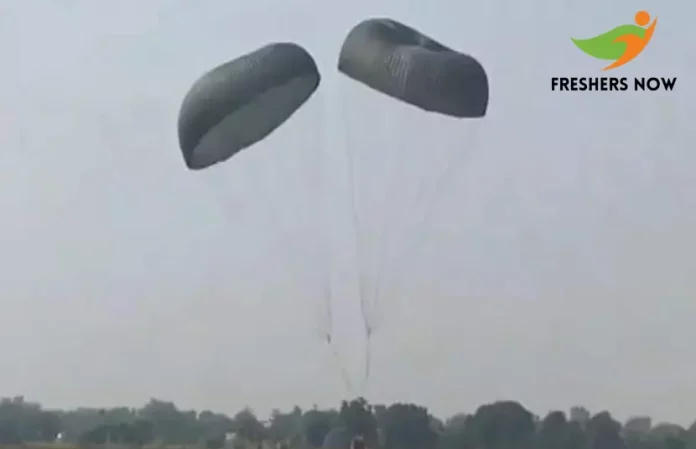
Indian Air Force Tests BHISHM Portable Hospital in Agra: On 14th May 2024, the Indian Air Force conducted field tests of the Arogya Maitri Cube- BHISHM portable hospital through an airdrop in Agra, Uttar Pradesh. This marked the first deployment of this innovative medical solution by the Indian Air Force, showcasing its commitment to improving rapid medical response capabilities during emergencies.
Project BHISHM: Revolutionizing Disaster Response
The BHISHM portable cubes are a crucial component of “Project BHISHM” or Bharat Health Initiative for Sahyog, Hita, and Maitri. This initiative is specifically designed to handle up to 200 casualties simultaneously, emphasizing its focus on swift and extensive medical care in disaster scenarios.
Capabilities of BHISHM Aid Cube
Equipped with cutting-edge tools such as Artificial Intelligence (AI) and data analytics, the Aid Cube ensures effective coordination and real-time monitoring, thereby optimizing the management of field medical services. With 72 easily transportable components, these cubes can be moved by hand, cycle, or potentially by drones, offering unparalleled versatility.
Deployment and Application
The BHISHM cubes are not only air-droppable but also robust, waterproof, and lightweight, enabling rapid deployment within 12 minutes. This quick deployment capability ensures efficient utilization of the cubes in various emergencies, including mass casualty incidents (MCIs).
Previous Deployment and Future Potential
Earlier in the year, during the Pran Pratishtha ceremony on 22 January in Ayodhya, two Arogya Maitri Disaster Management Cube-BHISHM units were deployed, showcasing their practical application and readiness to bolster medical preparedness and response efforts during significant public events. The successful testing and potential future implementations of the BHISHM cubes signify a significant step forward in India’s disaster response and healthcare management strategies, ensuring rapid medical aid is available anywhere when needed.
BHISHM Portable Cubes: Revolutionizing Emergency Medical Response
The Indian Air Force conducted field tests of BHISHM portable cubes on 14th May 2024, in Agra, Uttar Pradesh, marking the first deployment of this innovative medical solution. Designed as part of “Project BHISHM,” these portable cubes are aimed at enhancing rapid medical response capabilities during emergencies.
Unmatched Versatility and Mobility
The BHISHM Aid Cube comprises 72 easily transportable components, making it convenient to carry by hand, cycle, or potentially by drones. This unmatched flexibility ensures quick and efficient deployment, even in the face of mass casualty incidents (MCIs), where time is of the essence.
Rapid Deployment for Any Emergency
These cubes are robust, waterproof, and lightweight, designed for various configurations, making them ideal for diverse emergency scenarios. From airdrops to ground transportation, the cube can be rapidly deployed within 12 minutes, ensuring immediate response capability in critical situations.
Proven Practical Application
During the Pran Pratishtha ceremony in Ayodhya earlier this year, two Arogya Maitri Disaster Management Cube-BHISHM units were deployed, showcasing their practical application and readiness to bolster medical preparedness and response efforts during significant public events.
Conclusion
The successful testing and potential future implementations of the BHISHM cubes signify a significant step forward in India’s disaster response and healthcare management strategies. With their advanced capabilities and rapid deployment features, these portable cubes ensure that rapid medical aid is available anywhere and anytime it’s needed.
Stay updated with the latest current affairs and insightful blog posts by following FreshersNow. Don’t miss out on future content that keeps you informed and engaged!
| You Can Also Check | |
| Current Affairs | |



